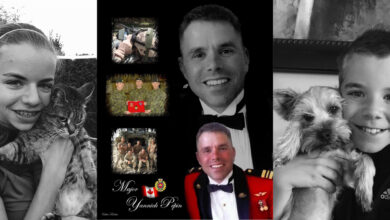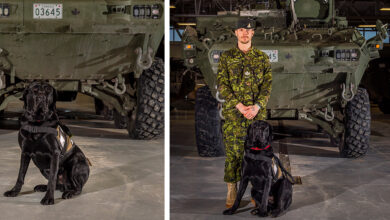Best of CMF Magazine
It was completely unexpected.
No one could have predicted that at around two o’clock on a Tuesday, six Canadian teenage boys would be dead, and over fifty would be lying beside them injured? On a rainy July day, one hundred and thirty eight Royal Canadian Army Cadets were brought into a barrack and told to sit on the floor for a lecture. The bunks had all been pushed to one end to accommodate them.
It was an explosives safety lecture. It was supposed to give the boys the information they needed to identify something dangerous so that they could report it to their superiors. If they discovered something, they were not to touch it, but report it. And they did. During the lecture when the inactive ordinance or “dummies” were passed around, the cadets remarked on one of the devices, asking if it was safe, if it was live, and could they pull the pin out. They had no reason to doubt the man giving the lecture; he was the commanding officer of the ammunition depot. He assured them a number of times that it was safe, and yes, they could pull the pin.
So, someone pulled the pin— It was not safe. It was live, and it detonated.
These were my cadets. I was their platoon sergeant.
It was many years, before I fully realized the impact this event had on my life: not only mine, but my family’s, my friends’, and co-workers’. It took a peer, someone who had been in the same position as me, someone who had seen what I had seen, to make me understand that the quirks, traits and eccentricities that I put down to character flaws, were probably a result of the trauma of 1974. I did what he suggested, and requested an assessment. He was right. I was suffering from post-traumatic stress disorder (PTSD). I wasn’t alone. It seems that most people suffering with PTSD need a peer to move them to take action to get help.
To explain to my family what had happened so long ago, I decided to write it all down and present it to them. That way I could do it at my own pace. It was a very difficult process. While writing, I came into contact with others who had been with me the day of the explosion. They, too, hadn’t spoken of it to their families. I decided that what I wrote would be beneficial for them, too. They could hand it to their families as their story, which of course, it was. When my wife Angie read it, she insisted that I take it to a publisher.
And now, because of my book, As You Were, I travel and speak to organizations about PTSD, and encourage those who recognize similarities with my story, to seek help.
I never anticipated that I would be doing this, but life is all about the unexpected. As Allen Saunders said, “Life is what happens to us while we are making other plans.”
It would be hard to pick out three books that I could call favourites. Favourites can change as moods do. There are three books that come to mind, though, probably because of what my current preoccupations are. Fifth Business by Robertson Davies, All My Friends are Superheroes by Andrew Kaufman, and The Town That Drowned by Riel Nason. They are completely different in their style, story and treatment, but there are two binding threads. Their central characters struggle to come to terms with events that are out of their control. They strive to gain some kind of control by attempting to at least understand their circumstances. The other common thread is they are all Canadian. All are riveting reads.
Gerry Fostaty
Twitter: @gfostaty
**This article was originally posted in out Fall 2014 issue**
Get More! Receive six issues of Canadian Military Family Magazine in your mail box for only $17.95! Click here to subscribe NOW!









